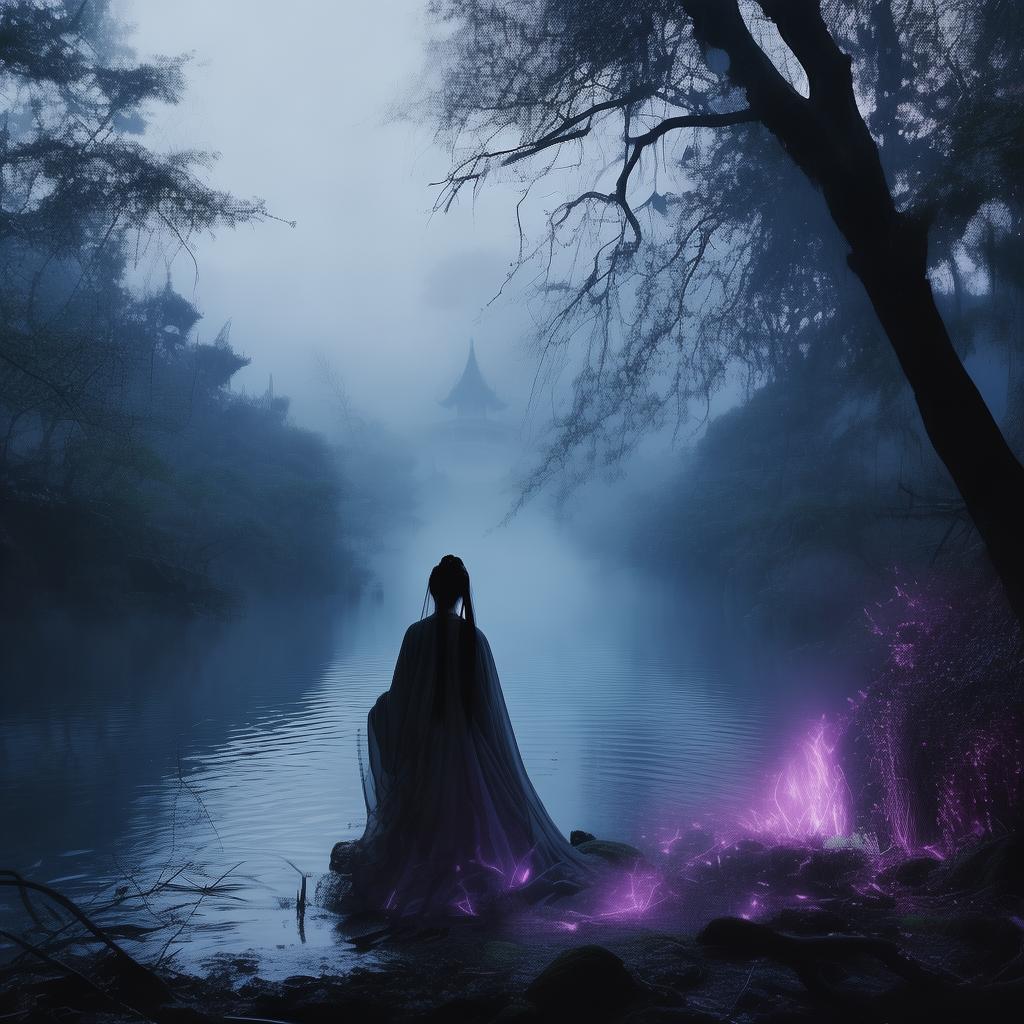The Demon's Lament: The Ballad of Unity
In the remote mountains of ancient China, where the whispers of the dead mingled with the breath of the living, there was a demon named Luo. Luo was not like the other demons, who dwelled in the shadows and fed on the fears of the living. Luo was a creature of curiosity, and more than anything, he desired to understand the humans who lived in the world above.
One fateful night, as Luo wandered through the misty valleys, he stumbled upon a village where a great festival was being held. The villagers, adorned in colorful attire, danced and sang, their laughter mingling with the sounds of traditional instruments. Luo was captivated by the warmth and joy that filled the air. He longed to join in, to feel the same sense of belonging that the villagers seemed to possess.
As the festival progressed, Luo noticed a young girl named Ling, whose eyes sparkled with the light of wonder. She was the daughter of the village elder, a wise and respected figure among the people. Luo felt an inexplicable connection to her, as if they were bound by some unseen thread.
Luo's desire to be part of the human world grew stronger with each passing day. He began to observe the villagers, learning their customs and their ways. He discovered that they had their own struggles and sorrows, just as he did. He saw the love between parents and children, the loyalty of friends, and the strength of the human spirit in the face of adversity.
One evening, as the moon hung low in the sky, Luo approached Ling and asked if he could join her in the dance. To his astonishment, she agreed, and together they moved through the crowd, their movements synchronized in a dance of unity. That night, Luo felt a profound sense of belonging, as if he had finally found his place in the world.

However, Luo's newfound happiness was short-lived. The villagers, who had grown accustomed to the presence of the demon, began to fear him. They whispered of his evil nature and his desire to harm them. Even Ling, who had once welcomed him with open arms, now looked upon him with suspicion.
Determined to prove his innocence, Luo sought the help of the village elder. The elder, a man of great wisdom, listened to Luo's tale and decided to test his intentions. He gave Luo a task: to gather the scattered pieces of a magical mirror that had been shattered by a great evil long ago. The mirror, according to legend, held the power to bring peace and unity to those who were separated.
Luo accepted the challenge and set out on a perilous journey. He traveled through treacherous mountains, crossed raging rivers, and faced the dangers of the supernatural world. Along the way, he encountered spirits who tested his resolve, and he learned the true meaning of courage and sacrifice.
After many trials, Luo finally found the last piece of the mirror. As he held it in his hands, he felt a surge of power and a deep sense of purpose. He returned to the village and presented the mirror to the elder. The elder, recognizing the truth in Luo's journey, used the mirror to heal the rift between the villagers and the demon.
The village was transformed. The fear and suspicion that had once divided them were replaced with understanding and acceptance. Luo was no longer seen as a threat but as a friend and a guardian. He and Ling, now inseparable, danced together under the moonlight, their steps a testament to the unity that had been restored.
However, Luo's journey was not yet complete. He realized that the true power of the mirror lay not in its ability to heal the world but in the unity it brought to those who believed in it. He decided to travel the land, spreading the message of unity and peace, and to write a ballad that would be passed down through generations.
The Ballad of Unity became a legend, a haunting and beautiful tale that spoke of the power of love, understanding, and the human spirit. It was a story that would inspire countless hearts and minds, reminding them that unity is the key to a world where all can live in harmony.
And so, Luo's lament became a song of hope, a testament to the enduring bond between the living and the supernatural. His ballad, The Ballad of Unity, would be the legacy that he would leave behind, a reminder that sometimes, even the most unlikely friendships could change the world.
✨ Original Statement ✨
All articles published on this website (including but not limited to text, images, videos, and other content) are original or authorized for reposting and are protected by relevant laws. Without the explicit written permission of this website, no individual or organization may copy, modify, repost, or use the content for commercial purposes.
If you need to quote or cooperate, please contact this site for authorization. We reserve the right to pursue legal responsibility for any unauthorized use.
Hereby declared.









